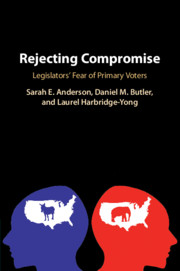Crossref Citations
This Book has been
cited by the following publications. This list is generated based on data provided by Crossref.
Brutger, Ryan
2021.
The Power of Compromise.
World Politics,
Vol. 73,
Issue. 1,
p.
128.
Harden, Jeffrey J.
and
Kirkland, Justin H.
2021.
Does Transparency Inhibit Political Compromise?.
American Journal of Political Science,
Vol. 65,
Issue. 2,
p.
493.
Rottinghaus, Brandon
and
Johnson, Isaiah
2021.
Presidential “Pitches” and White House Pressure: Interpersonal Presidential Persuasion in a Shared Lawmaking Environment.
Presidential Studies Quarterly,
Vol. 51,
Issue. 4,
p.
839.
Burke, Richard
Kirkland, Justin H.
and
Slapin, Jonathan B.
2021.
Party Competition, Personal Votes, and Strategic Disloyalty in the U.S. States.
Political Research Quarterly,
Vol. 74,
Issue. 4,
p.
1024.
Krupnikov, Yanna
and
Ryan, John Barry
2022.
The Other Divide.
Zelizer, Adam
2022.
Talking Shops: The Effects of Caucus Discussion on Policy Coalitions.
American Journal of Political Science,
Vol. 66,
Issue. 4,
p.
902.
Rubin, Ruth Bloch
2022.
Organizing at the Extreme: Hardline Strategy and Institutional Design.
Congress & the Presidency,
Vol. 49,
Issue. 1,
p.
1.
Hanousek Jr., Jan
Hanousek, Jan
and
Ferris, Stephen
2023.
Peering into the Crystal Ball: The Information Content of Legislative Trading.
SSRN Electronic Journal,
Anderson, Sarah E.
DeLeo, Rob
and
Taylor, Kristin
2023.
Legislators do not harness voter support for disaster preparedness.
Risk, Hazards & Crisis in Public Policy,
Vol. 14,
Issue. 1,
p.
68.
Bartels, Larry M.
and
Carnes, Nicholas
2023.
House Republicans were rewarded for supporting Donald Trump’s ‘stop the steal’ efforts.
Proceedings of the National Academy of Sciences,
Vol. 120,
Issue. 34,
Hutchinson, Rachel
and
Reilly, Benjamin
2023.
Does Ranked Choice Voting Promote Legislative Bipartisanship? Using Maine as a Policy Laboratory.
SSRN Electronic Journal,
Harbridge-Yong, Laurel
Volden, Craig
and
Wiseman, Alan E.
2023.
The Bipartisan Path to Effective Lawmaking.
The Journal of Politics,
Vol. 85,
Issue. 3,
p.
1048.
Anderson, Sarah E.
Butler, Daniel M.
Harbridge‐Yong, Laurel
and
Markarian, G. Agustin
2023.
Driving Legislators' Policy Preferences: Constituent Commutes and Gas Taxes.
Legislative Studies Quarterly,
Vol. 48,
Issue. 1,
p.
203.
Barker, David C.
Carman, Christopher J.
and
Bowler, Shaun
2023.
Humanitarianism, Egalitarianism, and Public Support for Political Compromise.
American Politics Research,
Vol. 51,
Issue. 1,
p.
91.
Barton, Richard
2023.
The primary threat: How the surge of ideological challengers is exacerbating partisan polarization.
Party Politics,
Vol. 29,
Issue. 2,
p.
248.
Butler, Daniel M.
and
Harden, Jeffrey J.
2023.
Can Institutional Reform Protect Election Certification?.
The ANNALS of the American Academy of Political and Social Science,
Vol. 708,
Issue. 1,
p.
257.
Beitz, Charles R
and
Brady, Henry E
2024.
For the People?.
Marshall, Renae
Anderson, Sarah E.
Van Boven, Leaf
Al-Shawaf, Laith
and
Burgess, Matthew G.
2024.
Neutral and negative effects of policy bundling on support for decarbonization.
Climatic Change,
Vol. 177,
Issue. 4,
Rafail, Patrick
O’Connell, Whitney E.
and
Sager, Emma
2024.
Polarizing Feedback Loops on Twitter: Congressional Tweets during the 2022 Midterm Elections.
Socius: Sociological Research for a Dynamic World,
Vol. 10,
Issue. ,
Sherman, David K.
and
Van Boven, Leaf
2024.
The connections—and misconnections—between the public and politicians over climate policy: A social psychological perspective.
Social Issues and Policy Review,
Vol. 18,
Issue. 1,
p.
31.



